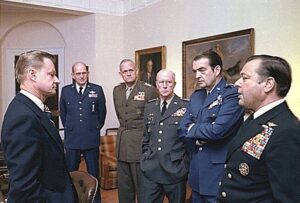While American interventionists remain stone-cold silent about the way that the Pentagon, operating through its old Cold War dinosaur NATO, knowingly, deliberately, and intentionally provoked Russia into invading Ukraine, it’s instructive to remind ourselves that this wasn’t the first time that the Pentagon provoked Russia into invading another country.
Let’s go back to 1979, when the Pentagon was still waging its old Cold War racket. That was the year that U.S. officials devised a successful plot to provoke the Soviets into invading Afghanistan.
Now, before you exclaim, “Conspiracy theory, Jacob!” which is the standard official response whenever someone criticizes dark-side activities on the part of the U.S. national-security establishment, permit me to disclose something important: There is a confession.
Yes, you read that last part correctly. There is a confession on the part of the national-security establishment that that is precisely what they did. Even for those who are loath to ever acknowledge that the national-security establishment engages in evil, dark-side activity, a confession is rather persuasive evidence that takes matters out of the realm of “conspiracy theory” and places them squarely in the realm of an actual conspiracy.

Zbigniew Brzezinski with members of the Joint Chiefs of Staff. Licensed under Creative Commons.
The confessor was Zbigniew Brzezinski, who served as President Jimmy Carter’s national-security advisor in 1979. He confessed that the U.S. knowingly, deliberately, and intentionally provoked the Soviets into invading Afghanistan.
Mind you, Brzezinski didn’t confess until 1998, some 20 years after the Soviet invasion. Therefore, it stands to reason that if anyone raised the possibility in 1979 that the U.S. provoked the invasion, the standard response would have been “Conspiracy theory!” This is especially true given that U.S. officials were playing the innocent after the invasion. With the same degree of indignation and outrage they are displaying with respect to Russia’s invasion of Ukraine, they castigated and condemned the Russians for their act of aggression against Afghanistan. They even canceled U.S. participation in the 1980 Summer Olympics in Russia, as a way to punish the Russians for invading Afghanistan.
In 1998, Brzezinski gave an interview to a French newspaper in which he confessed all. You can read the interview here. (For a full context of Brzezinski’s confession, see an article at Aljazeera entitled “Afghanistan: The Soviet Union’s Vietnam.”) He stated that U.S. officials began arming extremist Muslim elements in Afghanistan who were attempting to oust the pro-Russia regime that was controlling Afghanistan. By doing this, the hope was that the Soviets would invade Afghanistan to put down the anti-Russia Jihadists.
The planned worked. The Soviets invaded, and U.S. officials were ecstatic. Brzezinski proudly stated that the plan had now given the Soviets their own Vietnam. What he was referring to was the 10-year-plus U.S. intervention in Vietnam, which had sacrificed more than 58,000 American soldiers for nothing. U.S. officials were now celebrating the fact that thousands of Russians soldiers were also now going to get sacrificed for nothing.
Just as U.S. officials had hoped, over the next 10 years more than 14,000 Soviet soldiers were killed. (Some estimates go as high as 26,000). Another 53,753 were wounded.
Needless to say, the deaths of Russian soldiers made U.S. officials extremely happy because the deaths were degrading the Soviet regime.
What kind of regime does this sort of thing? What kind of regime provokes another regime into invading a country knowing that this will bring massive death and destruction on both sides? What kind of regime celebrates and revels in the fact that foreign soldiers, all of whom have families or friends back home, are being killed and wounded?
I’ll tell you what kind of regime engages in those sorts of things: An evil regime. There is no better way to describe it.
When Brzezinski was asked about the potential consequences of arming extremist Jihadist groups in Afghanistan, he replied, “What is most important to the history of the world? The Taliban or the collapse of the Soviet empire? Some stirred-up Moslems or the liberation of Central Europe and the end of the cold war?”
Three years later came the 9/11 attacks, followed by the U.S. government’s own invasion of Afghanistan, an invasion that turned into a twenty-year quagmire, as well as the perpetual war on terrorism and, ultimately, the current revival of the Cold War racket against Russia. The U.S. national-security plot to provoke Russia into invading Afghanistan in 1979 ended up boomeranging on the American people, big time.



